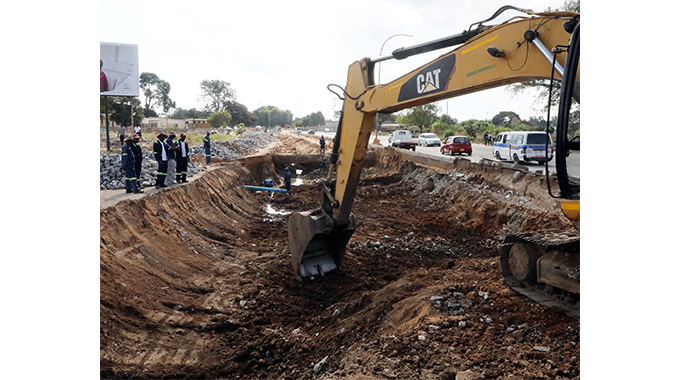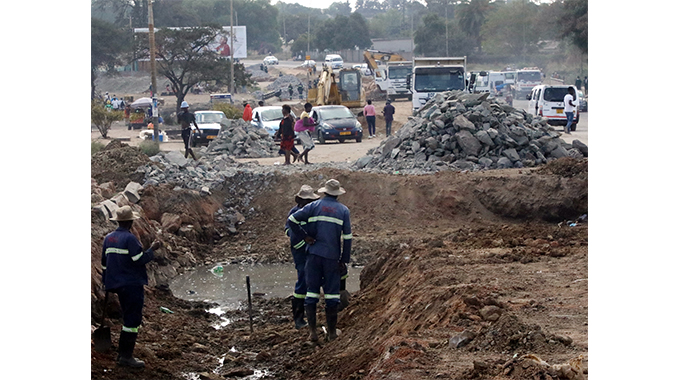Fungi Kwaramba Political Editor
IN as much as Zimbabwe is open for business, the country is not open to abuse and will not condone mineral leakages, haphazard operations, and breaches of it’s laws, President Mnangagwa has said.
Launching the Responsible Mining Initiative Audit at State House in Harare yesterday, President Mnangagwa said his Government will increase oversight over all mining activities in the country and will not condone malpractices.
The mining sector is central to the attainment of the country’s Vision to become an upper-middle-class economy by 2030. This year the sector is expected to grow by 300 percent through new operations, old but resuscitated projects, increased investor confidence due to the ideal operating environment, and discovery of new mining claims, among other favourable factors.
However, increased activity in the sector should be accompanied by increased responsibility, increased wages for workers, and also increased benefits for communities.
To achieve this, the Responsible Mining Audit initiative is expected to provide oversight on the sector and ensure compliance with the country’s statutes.
“To enhance greater compliance, a Responsible Mining Audit will be conducted countrywide covering the entire mining sector value chain, including both small-scale and large-scale mines. The Audit will establish a framework that promotes responsible mining practices while guaranteeing the well-being of the communities and environments where mining activities are taking place. Zimbabwe is open for business but is not open for abuse,” President Mnangagwa said.
“This Initiative represents an essential milestone in our journey towards a sustainable US$12 billion mining industry. Furthermore, the programme is an indispensable undertaking in my Government’s quest to exercise good stewardship over the many natural and mineral resources that our beautiful country, Zimbabwe, has been blessed with by the Almighty God”.
The exercise, which will be led by a team that comprises Government Ministries, Departments, and Agencies, will see thorough investigations of activities within the various mining entities, with the objective of highlighting challenges and proffering recommendations towards the overall improvement of the mining sector.
“A situation where the sector is characterised by malpractices such as environmental degradation, mineral leakages and haphazard operations conducted outside the legal provisions of our country, can never be condoned,” said the President.
He said attention will be accorded to adherence to aspects related to environmental management, immigration, tax, labour relations, and provisions of the Mines and Minerals Act, among others, in accordance with the spirit and letter of the country’s laws.
“All mining entities, with no exception and regardless of size, should abide by our country’s laws”.
Through a shared vision between Government and the private sector, there is a need to adapt to the evolving world and ensure optimal exploitation of the mineral wealth for the well-being of Zimbabweans.
“Together, we must embrace methods that minimise harm and maximise benefits for investors and the generality of the people of Zimbabwe.
“In line with this, assessments must include potential risks associated with each project, before commencement and also incorporate detailed plans for site reclamation upon closure of the mine. By prioritising environmental matters, we are keen to protect our natural ecosystems and preserve natural resources for both present and future generations.
“Additionally, this Responsible Mining Initiative will put due emphasis on workers’ rights, community engagement as well as health and safety matters. Aspects on addressing the unique priority needs of local communities remain important. Employees who are indeed the anchor of production and productivity within mining activities should be awarded fair wages,” President Mnangagwa said.
In the quest by the Second Republic to initiate developmental projects that leave no one and no place behind, the President said mining companies should complement Government efforts to modernise and industrialise Zimbabwe.
“By embracing this Responsible Mining Initiative, we are securing a better future, not only for ourselves but also for generations to come. Additionally, responsible mining can lead to greater efficiency and cost savings over the long term, as companies are better able to manage risks and optimise their operations.
“Let us, therefore, continue working together towards a more sustainable and equitable world where our shared resources positively contribute to the prosperity and well-being of all peoples and the good of the planet”.
To come up with a mining sector that conforms to global best practices, President Mnangagwa called upon the audit teams to be professional by shunning corruption.
“You are directed to conduct the exercise diligently, with uttermost professionalism. Corruption and connivance of any form and kind, will not be tolerated.
“I call for unity of purpose and maximum co-operation from mining companies with regards availing essential information requested by the Audit teams. Ultimately, this exercise must result in the adoption of an appropriate model for our mining sector, informed by global best practices and blended with Zimbabwe’s unique socio-economic realities,” he said.
Vice President Constantino Chiwenga, Minister of Defence and War Veterans Oppah Muchinguri Kashiri, and the Minister of Mines and Mining Development, Winston Chitando, attended the launch of the audit along with mining executives.
In his introductory remarks, Minister Chitando said the audit comes at a time when there is a realisation that some miners are not members of any mining body and not compliant with the country’s laws.
Thus the audit is designed to ensure the mining sector has a positive lasting effect, not only on the economy but also on communities.






